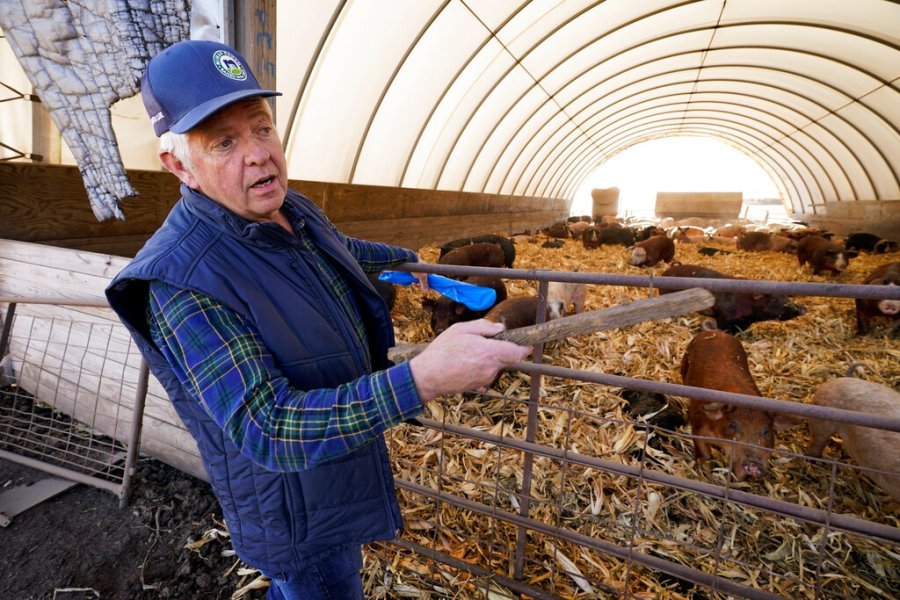
I was taken aback by Duane Stateler’s Oct. 11 op-ed, “Pork prices are rising thanks to California — Congress can fix it.” Like Stateler, I am a multi-generation farmer. My family has raised livestock and grain on the same Missouri land for over a century. But although we share a love for farming, we part ways on what’s best for America’s independent hog producers.
California’s Proposition 12, which set higher welfare standards for animals sold in that state, isn’t a threat to farmers like me. In fact, it’s one of the few market opportunities that’s actually helping us stay on our land and make a fair living.
It’s no surprise that Stateler would take this position; as president of the National Pork Producers Council, he represents an organization that calls itself “the global voice for the U.S. pork industry.” In practice, that means advocating for the largest corporate pork producers and processors. But there is another voice in this fight, that of the independent family farmers — the men and women who raise hogs, sheep and cattle on their own land, care for their animals, and keep rural America alive.
California’s Proposition 12 doesn’t ban pork production or impose arbitrary rules. It simply sets minimum space standards for all animals sold into California’s market — enough room to stand, lie down and turn around. California isn’t dictating how farmers operate. Voters there simply chose to support higher animal welfare standards with their dollars — something farmers like me can meet if we’re given a fair shot. That’s the free market at work, and it’s precisely what independent farmers depend on.
What’s really at stake here is control — who gets to shape the future of farming: independent producers or corporate packers? The same corporate interests that claim to defend farmers from regulation are actually consolidating our industry and blocking us from accessing the market. Their philosophy is “get in line or get out.” When they talk about “uniform standards,” they mean a system where they hold all the power — where it’s acceptable to confine a sow (a mother pig) in a two-by-seven-foot cage for most of her life.
Critics claim that Proposition 12 has driven pork prices sky-high, but the facts tell a different story. Since enforcement began in January 2024, retail pork chop prices in California have risen just 6.6 percent — a normal, short-term adjustment as supply catches up with demand. The headline-grabbing 41 percent increase happened years earlier, long before Proposition 12 took effect, during pandemic-era market corrections following record-low 2019 hog prices. Blaming Proposition 12 for inflation is like blaming the weatherman for the storm.
Some say this law undermines interstate commerce. The Supreme Court already weighed that claim and upheld the law, affirming what farmers have long understood: States have the power to decide what products can be sold within their borders. That principle isn’t government overreach — it’s federalism in action, the very balance our system was designed to protect.
Yet Congress is now considering the Food Security and Farm Protection Act and the Save Our Bacon Act — rebranded versions of the failed EATS Act — that would strip states of that authority. These bills would tell voters and consumers that their choices don’t matter when corporate lobbyists object.
Critics also insist Proposition 12 hurts small farmers. The truth is, it’s one of the few policies giving us a fighting chance. Between 1980 and 2022, the number of U.S. hog farms fell by more than 70 percent, even as total production rose — a collapse not caused by animal welfare laws, but by corporate consolidation, weak antitrust enforcement, and vertically integrated packers like China’s Smithfield and Brazil’s JBS.
Proposition 12 changes that by creating a premium market for farmers raising hogs in higher-welfare systems. About 27 percent of producers are already compliant — family operations investing in the future, who deserve a fair shot at that market and don’t need Congress to strip them of their livelihoods and investments.
The real risk is the industrial model pushed by the National Pork Producers Council — a system that concentrates production, crushes competition and leaves rural communities hollowed out. When a few multinational corporations control nearly all slaughter capacity, one plant closure can ripple through the entire supply chain. That setup doesn’t make our food system resilient; it makes it dangerously fragile.
I respect every farmer who works hard to care for their animals and feed their neighbors. But the National Pork Producers Council doesn’t speak for me — or for the thousands of independent farmers who see Proposition 12 as a lifeline — an opportunity to compete fairly and stay in business.
We don’t need Congress to “fix” Proposition 12. We need Congress to fix the broken markets that have pushed farmers like me to the brink.
Joe Maxwell is a fourth-generation Missouri hog farmer and president of Farm Action Fund.






